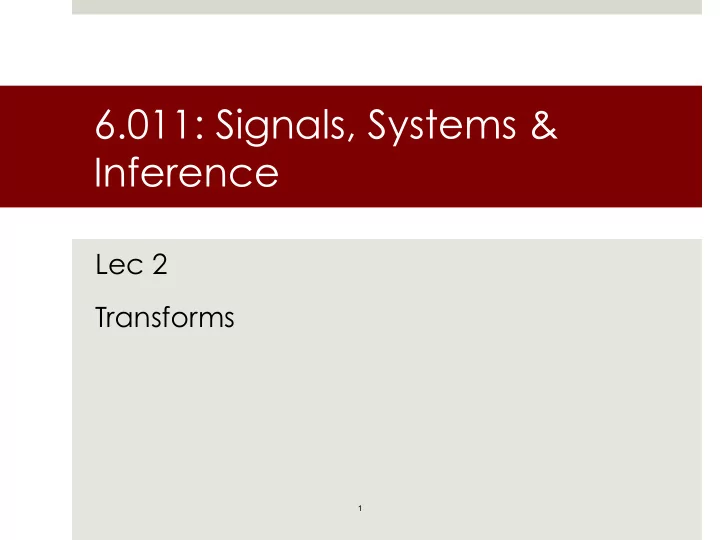

6.011: Signals, Systems & Inference Lec 2 Transforms 1
DT convolution to z-transform (and system function) ∞ X y [ n ] = h [ k ] x [ n − k ] k = −∞ n x [ n ] = z all n , 0 ∞ ⇣ X k ⌘ n y [ n ] = h [ k ] z − z 0 0 k = −∞ | {z } H ( z 0 ) 2
DT convolution to DTFT (and frequency response) ∞ X y [ n ] = h [ k ] x [ n k ] − k = −∞ j Ω 0 ) n x [ n ] = ( e , all n, and π < Ω 0 ≤ π − ∞ ⇣ X j Ω 0 k ⌘ j Ω 0 ) n y [ n ] = h [ k ] e ( e − k = −∞ | {z } H ( e j Ω 0 ) 3
Using frequency response to specify response to sinusoidal inputs x [ n ] = A cos( Ω 0 n + θ ) ⇣ ⌘ | H ( e j Ω 0 ) | A cos Ω 0 n + θ + ∠ H ( e j Ω 0 ) y [ n ] = 4
Frequency response (DTFT of unit sample response) ∞ X H ( e j Ω ) = j Ω k h [ k ] e − k = −∞ When is the above infinite sum well-defined? 1 Z π H ( e j Ω ) e j Ω n d Ω h [ n ] = 2 π − π 5
Spectral content of a signal (DTFT of the signal) ∞ X X ( e j Ω ) = j Ω k x [ k ] e − k = −∞ 1 Z π X ( e j Ω ) e j Ω n d Ω x [ n ] = 2 π − π 6
Classes of DT signals that have DTFTs Absolutely summable (finite “action”, have continuous spectra) – or not, but … Square summable (finite “energy”, spectra have discontinuities) – or not, but … Bounded (finite amplitude, spectra involve generalized functions like impulses) 7
Convolution in time to multiplication in frequency Putting together frequency response, spectral content, and superposition, we find y [ n ] = h ∗ x [ n ] in the time domain translates to Y ( e j Ω ) = H ( e j Ω ) X ( e j Ω ) in the frequency domain. 8
Exercise Derive the DTFT of ∞ X r [ n ] = x [ k ] x [ k − n ] k = −∞ 9
MIT OpenCourseWare https://ocw.mit.edu 6.011 Signals, Systems and Inference Spring 201 8 For information about citing these materials or our Terms of Use, visit: https://ocw.mit.edu/terms. 10
Recommend
More recommend